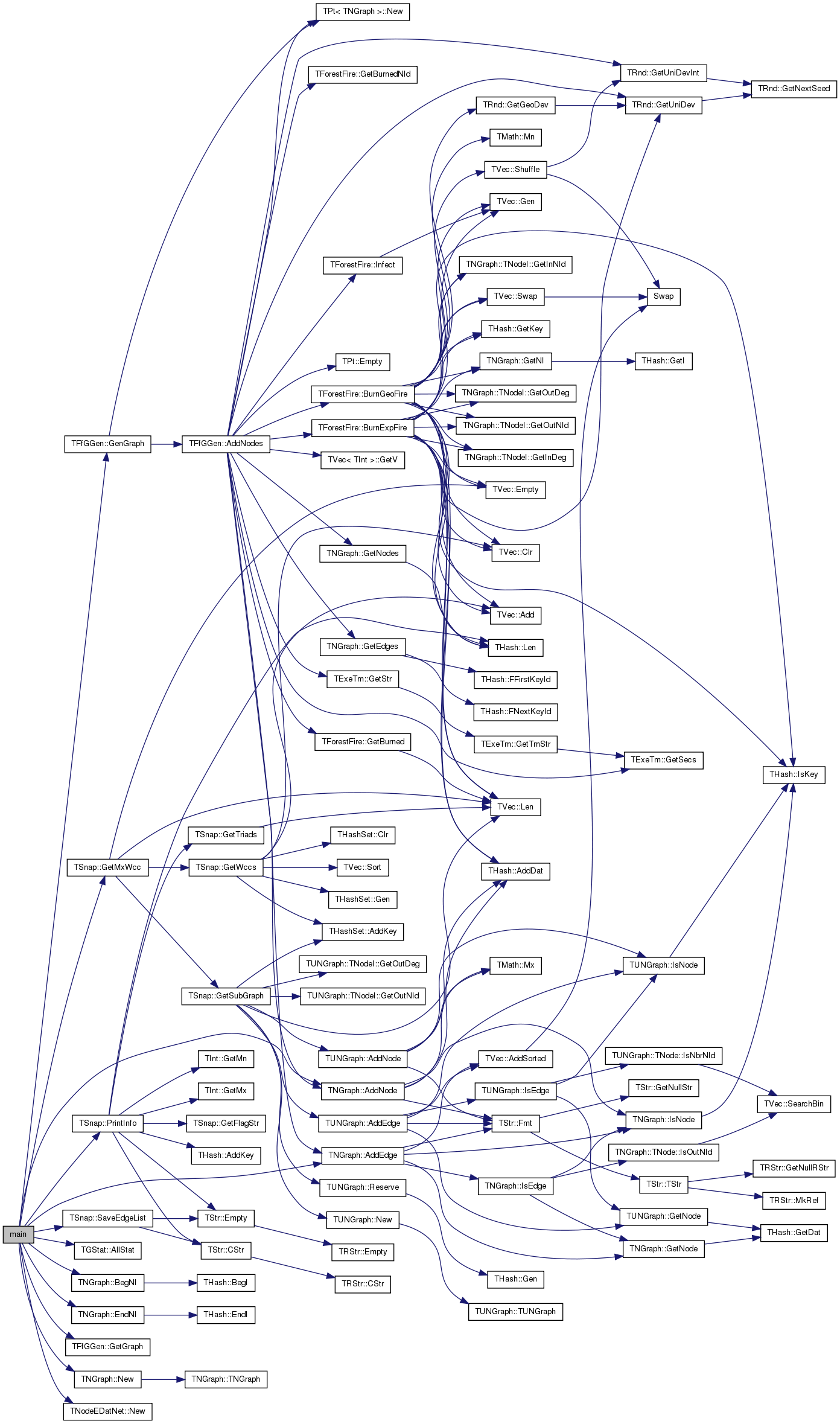|
SNAP Library , Developer Reference
2013-01-07 14:03:36
SNAP, a general purpose, high performance system for analysis and manipulation of large networks
|
|
SNAP Library , Developer Reference
2013-01-07 14:03:36
SNAP, a general purpose, high performance system for analysis and manipulation of large networks
|
#include "Snap.h"
Go to the source code of this file.
Functions | |
| int | main (int argc, char *argv[]) |
| int main | ( | int | argc, |
| char * | argv[] | ||
| ) |
Definition at line 5 of file testSnap.cpp.
References TNGraph::AddEdge(), TNGraph::AddNode(), TGStat::AllStat(), TNGraph::BegNI(), TNGraph::EndNI(), TFfGGen::GenGraph(), TFfGGen::GetGraph(), TSnap::GetMxWcc(), TNGraph::New(), TNodeEDatNet< TNodeData, TEdgeData >::New(), TSnap::PrintInfo(), TInt::Rnd, and TSnap::SaveEdgeList().
{
// create a graph and save it
{ PNGraph Graph = TNGraph::New();
for (int i = 0; i < 10; i++) {
Graph->AddNode(i); }
for (int i = 0; i < 10; i++) {
Graph->AddEdge(i, TInt::Rnd.GetUniDevInt(10)); }
TSnap::SaveEdgeList(Graph, "graph.txt", "Edge list format"); }
// load a graph
PNGraph Graph;
Graph = TSnap::LoadEdgeList<PNGraph>("graph.txt", 0, 1);
// traverse nodes
for (TNGraph::TNodeI NI = Graph->BegNI(); NI < Graph->EndNI(); NI++) {
printf("NodeId: %d, InDegree: %d, OutDegree: %d\n", NI.GetId(), NI.GetInDeg(), NI.GetOutDeg());
printf("OutNodes: ");
for (int e = 0; e < NI.GetOutDeg(); e++) { printf(" %d", NI.GetOutNId(e)); }
printf("\nInNodes: ");
for (int e = 0; e < NI.GetInDeg(); e++) { printf(" %d", NI.GetInNId(e)); }
printf("\n\n");
}
// graph statistic
TSnap::PrintInfo(Graph, "Graph info");
PNGraph MxWcc = TSnap::GetMxWcc(Graph);
TSnap::PrintInfo(MxWcc, "Largest Weakly connected component");
// random graph
PNGraph RndGraph = TSnap::GenRndGnm<PNGraph>(100, 1000);
TGStat GraphStat(RndGraph, TSecTm(1), TGStat::AllStat(), "Gnm graph");
GraphStat.PlotAll("RndGraph", "Random graph on 1000 nodes");
// Forest Fire graph
{ TFfGGen ForestFire(false, 1, 0.35, 0.30, 1.0, 0.0, 0.0);
ForestFire.GenGraph(100);
PNGraph FfGraph = ForestFire.GetGraph(); }
// network
TPt<TNodeEDatNet<TStr, TStr> > Net = TNodeEDatNet<TStr, TStr>::New();
Net->AddNode(0, "zero");
Net->AddNode(1, "one");
Net->AddEdge(0, 1, "zero to one");
return 0;
}
